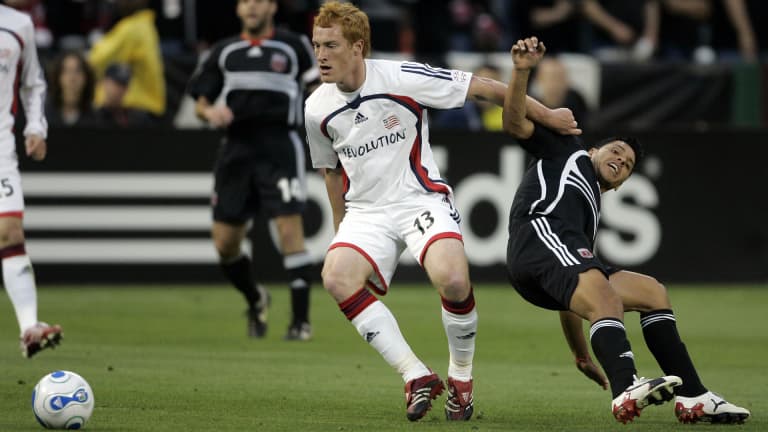Jeff Larentowicz played 437 regular-season games with five clubs over 16 years in MLS. He’s spent somewhere over two decades of his life seriously dedicated to soccer and a large majority of the years before that building towards the opportunity to dedicate himself to soccer.
Then on April 5, Larentowicz announced (in true Larentowicz fashion) through someone else’s Twitter account that his career as a player had come to an end. So, what’s he going to do now?
“I’ve been doing a lot of gardening,” he said.
So what to make of this new life as a humble garde--
“No, not actually,” he quipped.
Okay, so maybe not actually garde--
“But really, I am.”
Whether he’s gardening or not remains a bit unclear. What’s definite is that slamming the brakes on the path you’ve been moving forward on for 37 years and simply getting out of the car is jarring. It would be for anyone. When your life has revolved around a single activity whose structure, intensity, schedule, pressure and community only increased over time, there’s whiplash at the end.
There’s no weekly practice schedule. There’s no diet plan created by team trainers. There’s no real reason to get a run in unless you just kind of want to. Not running actually feels pretty good to ignore if you admit you ran out of general fear for your job anyway. There’s a void now, though. For any of us who have abandoned a career, a faith, or anything else you can truly dedicate yourself to, you know the negative space left after it ends. Now amplify that with the lifelong level of intrinsic pressure it takes to become a professional athlete and the extrinsic pressure you earn when you get there.
“I'm a guy that likes being told what to do. So when I've got to do it on my own, it's a little harder,” Larentowicz told MLSsoccer.com during a recent interview. “I've done a lot of catching up with guys over the last few months and one referred to it as PTSD. He's like, ‘I’ve got a lot of PTSD stuff I'm still dealing with.’ Not to make light of PTSD at all, but I'm sure it is a post-traumatic kind of syndrome that everyone goes through.
“I think that the mental health of athletes is something that people should all kind of take notice of because it is a serious issue. You're on a narcotic for a long time. A really long time. And it feeds your ego. It feeds your body. It feeds you to the molecular level and then it stops, whether you want to admit it or not. A currently performing athlete will never admit it, but there's an effect. No question.”
Perhaps that effect would be dampened by retiring to a mansion by the beach and relaxing for the next 40 years. The reality is a little different for Larentowicz, however.
Larentowicz began life in MLS with the New England Revolution as the 45th pick in the 2005 Supplemental Draft. At the time, that meant appearing for exactly one recorded minute during his first MLS season and cashing $421 checks every two weeks. His playing time obviously increased from there, as did his salary. But not to the point where retirement means a few decades or so off from work while you pursue whatever hobby you can find.
For Larentowicz, retirement could be better described as a career transition.
“I love the game. I'm always going to. It's always going to be a part of me," he said. "Like I said, I've been speaking to other guys, they all say it gets easier, but it never leaves you. I'm sure I'll always have it in me. But I think what I've found in talking to a lot of people is I've built up a lot of skills in a very unique kind of framework and career. And if I'm honest with myself, there are a lot of things I lack and maybe I need to go out and find those things, develop those things and ultimately kind of become more rounded as a person, as a hireable employee and then potentially reenter soccer. But I haven't made any decisions yet. I'm still working on it.”
Those conversations about career transitions aren’t necessarily frightening, but they are heavy. And maybe a bit too constant right now. Larentowicz said that they all might be coming together to create a bit of “analysis paralysis.” But it might be OK to sit still for a second. Creating an identity besides “Jeff, the soccer player” when you’ve been “Jeff, the soccer player” for so long will take time. He’s outlasted time and doubt before, too.
Remember, “Jeff, the soccer player” began his MLS career as “Jeff, the dude on the bench.” It took a year before he earned regular playing time with the Revolution. Even after he earned that playing time, he spent years fighting for his spot on the field.
Even after 12 seasons in MLS, Larentowicz arrived at Atlanta United, an expansion team, without a starting spot. In one of the team’s very first practices, players were told to split into first and second strings for a scrimmage. Larentowicz went to go grab the pinnie the rest of the starters were putting on. Atlanta’s manager, Tata Martino, looked at him all confused and waved him away. Larentowicz didn’t start the first game in Atlanta United history. He started 89 after that.
“Once you know yourself and you know your attributes and you say, ‘I'm OK with those,’ then you kind of can start to grow and you become good at what you're good at and even better at what you're good at,” Larentowicz said. “I knew that I was the guy at the beginning of the year who had to prove himself. And when a new coach came in, it was like, 'I know this guy's not going to like me from the start. I've just got to chip away and show him every day that I’ve got what it takes.'"
Larentowicz chipped away in Atlanta until he became a somewhat surprising fan favorite and a completely surprising key piece to the club’s success. It all almost seemed like a reward for putting in the work long before games were played at Mercedes-Benz Stadium. Because he nearly didn’t get the chance. A bizarre choice from starting midfielder Carlos Carmona resulted in a late-game red card in Atlanta’s first-ever game. Larentowicz stepped in and never looked back.
It’s one of those little blips in your career that you may not really think about at the time, but it’s a pretty darn pivotal moment. Sometimes they’re noticeable in the short term, like a red card that gives you a chance to prove your worth as a starter. Sometimes you have to go further back than that.
When Larentowicz came to Brown University as a freshman, he got tasked with not only being a forward but a host for recruits. Understandably, showing high school kids around gets old after a while. One weekend, Larentowicz got put in charge of two recruits and pretty quickly left them on their own so he could head out to a Halloween party instead. The recruits don’t come to Brown. One, a center back named Michael Parkhurst, went to Wake Forest instead.

The next year, Brown had injury issues at center back. With no depth available, Larentowicz moves from forward to defender. He later entered MLS and stayed as a defensive midfielder. He’ll play alongside Parkhurst, a standout player and generation Adidas signing out of Wake Forest, for the Revolution at the beginning of his career and win an MLS Cup with him in Atlanta at the end of it. Along the way, stops with the LA Galaxy, Colorado Rapids and Chicago Fire FC also arose.
Sometimes you catch a break that makes it all work out, even if you don’t know it at the time. Those butterfly effects theoretically make a successful career transition feel a little more plausible. Because if all of those tiny moments can conspire to create a memory like this, then so can the moments that lead to a new path.
“We all, fans included, we all got on a ride [in Atlanta] and we were on that ride for years. That was fun. That was all of it put together, I think more than anything, it was kind of like, ‘Is this really happening?’ We were pretty focused, but we felt that too driving through neighborhoods and seeing flags and license plates. It's like, ‘Wow, this is real,’” Larentowicz said.
“I think it’s something that’s gonna stay with people, too, for a long time. I don't think it's going to change because those memories are so strong. I remember the home Red Bulls playoff game when they had the tifo across the whole stadium and then people were saying what can the team do next? Or what can the front office come up with next? And I was like, ‘Oh, if they can make the stadium levitate. That's the only way they could top that.’ We were all just kind of levitating at that time. During that time it was just like, ‘This is something special.’”
The ride is going to be different now. The first car is stopped. It’s onto the next one. Whether that means Larentowicz doing a bit more gardening than expected or finding a new way of defining himself, it probably doesn’t involve much levitation. Not initially anyway. However, we’re years into this now. We’re years into watching him chip away and win over coaches and teammates and fans.
“Now what?” may not have an answer right away. But there’s a question that does have an answer: Who’s going to doubt Jeff Larentowicz? The answer should be nobody. The answer will be that it doesn’t matter.














